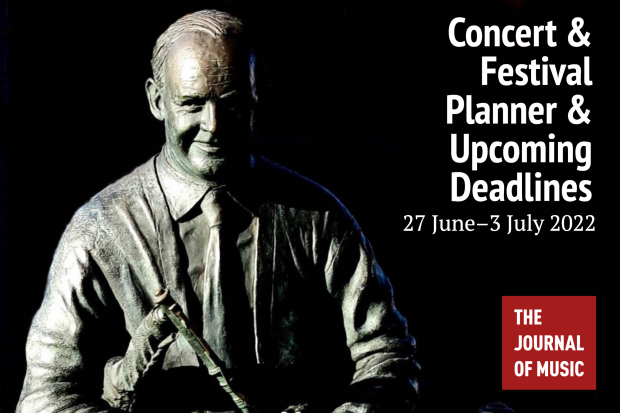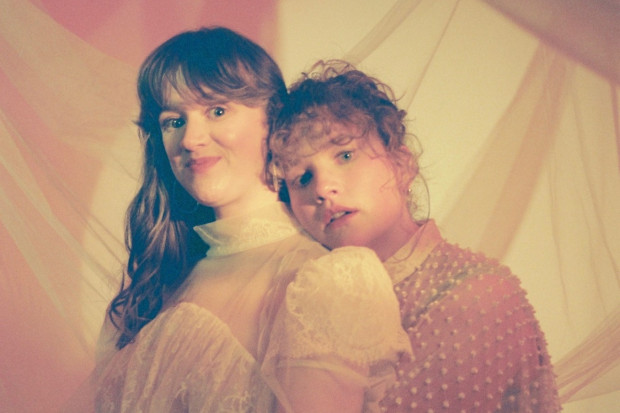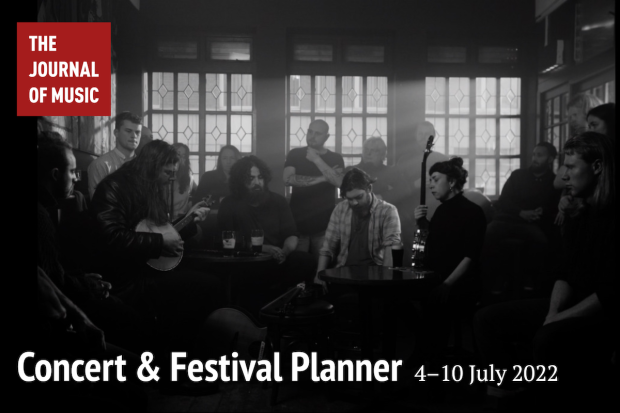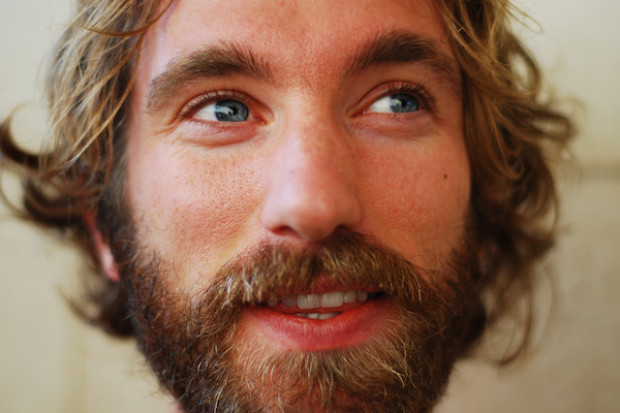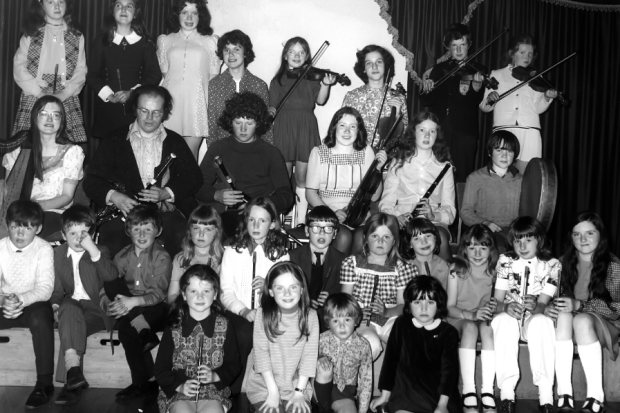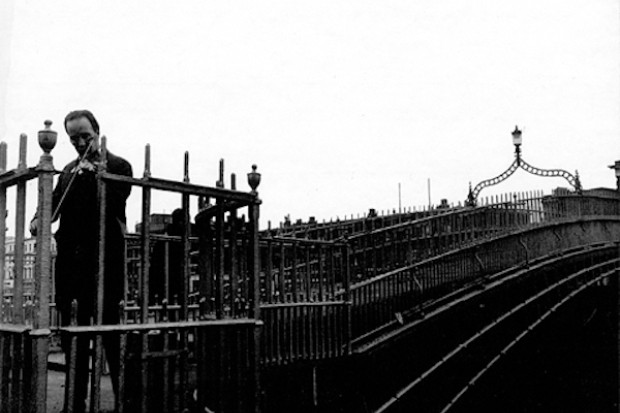
Leo Rowsome teaching a group of pupils in December 1950
Leo Rowsome: A Man Ahead of His Time
I grew up in a very happy musical atmosphere on Dublin’s north side, where my father made and repaired countless sets of uilleann pipes. My first memory was one of excitement when I heard him testing a chanter reed in his workshop at the back of the house – the sound was akin to a highly pitched beep beep; he always tested his chanter reeds that way. I loved that sound, as I knew that my father was not far away. His workshop windows looked out onto the yard at the side, and the garden at the back. I recall the day my brother’s hurling ball came through the window and landed on the workbench, having just missed a line of freshly painted bellows boards.
Leo was a cheerful man and a very patient father. Memorable too was the strong smell from the rubber solution that he used to seal the pipes bags. After making a few, he would rub his hands and form a small ball with the residue and bounce it out the window into the yard where my sister and I would chase after it down the garden – happy days.
The workshop was full of interesting bits and pieces that Leo would find on his travels. When in London playing for the BBC, he would visit second-hand shops where he would find small bits of ivory that would be used to ornate the extremities of a set of uilleann pipes. His lathe did not have a motor until the late 1950s.
I often think to myself how mesmerised he would be to observe the healthy state of uilleann piping and pipe-making today. He would, without doubt, be the happiest man in the world and give a big clap on the back to many.
The Leo Rowsome Quartet: Willie Clancy, Leon Rowsome (Leo’s son), Leo Rowsome and Sean Seery.
Teaching
Dad would have travelled by bus across Dublin to the Municipal School of Music (now TU Dublin) in the afternoons where he taught many of today’s well-known pipers, including Liam O’Flynn, Paddy Moloney, Peter Browne and Gay McKeon, as well as Garech de Brún who founded Claddagh Records. After his teaching ended at around 9.30pm and he arrived home, he would be encouraged by my mother to write a few more tunes before supper. That collection (including some of his own compositions) was prepared by myself and published by Waltons in 2003 as The Leo Rowsome Collection of Irish Music to commemorate the centenary of his birth. His 1936 Tutor for the Uilleann Pipes and a brief pictorial biography are included in the book.
In his professional life, Leo played on stage and adjudicated at fleadhanna in every county in Ireland. He blazed a trail for Irish music and the uilleann pipes from Covent Garden where he played in 1937 and later in Fontainebleau and Carnegie Hall. He played with the RTÉ National Symphony Orchestra in the RDS in 1969 in a remarkable arrangement by A. J. Potter of Fiach an Mhada Rua (The Fox Chase). He declined many invitations to visit the US, with the exception of the three-week trip he made in 1968. Having taken his reed-making kit with him, he told me that such was the demand for reeds that he could have spent the entire three weeks making them.
Leo was no stranger to the world of film, having appeared in a number of them, including The Playboy of the Western World which was filmed in Inch, Co. Kerry, in 1961, starring Siobhán McKenna and Gary Raymond. Leo provided the music for the dancers in the film. As the filming was drawing to its conclusion, he had to dash back to Dublin for an engagement and then return to the film set. As one newspaper journalist described it, ‘Leo returned in greater style than even the most glittering stars have displayed.’

Leo Rowsome presenting his pupils from the Municipal School of Music with their certificates won at Feis Átha Cliath in 1940.
Sailing concerts
Immediately afterwards, he boarded the Swedish–American liner, the MS Gripsholm at Glengarrif, and sailed around the Irish coast performing (often twice daily) for a charmed audience. The liner engaged him to perform for a couple of weeks every summer for almost a decade, until the ship embarked upon another route. He was later engaged to perform in the Irish concerts on the special Irish Festival Sailings on the Holland–America line’s SS Nieuw Amsterdam from Cobh to New York in 1967.
Leo made many recordings on 78RPM discs for various labels, including HMV, Imperial, Columbia and Decca, some of which were later released on the Topic label. He was the first to record for Claddagh Records on its formation in 1959 – Rí na bPíobairí: The King of the Pipers was a complete long-playing record of uilleann piping.
While lighting his pipe, he would say, ‘If we don’t smoke in this world, we’ll smoke in the next’. I enjoyed buying him a Cuban cigar in a tin tube for Christmas, as I knew that he would make good use of the tube when mailing reeds in the post. We were not allowed to discard small tins or boxes that could accommodate reeds for posting. We were encouraged to eat Jaffa oranges; in fact, he kept a large brown paper bag of them in his workshop – more for the tissue paper than for the tasty oranges – and he would wrap the reeds individually in the orange tissue paper and place them in a tin box in readiness for sending through the post.
My father gave me great confidence. I recall being with him in the Post Office while he was posting a set of pipes to the US – I loved being with him. He bought me a ‘lucky bag’ in which there was a very small tin whistle. On arriving home, I began to ‘play’ – the noise was piercing; my father sat at the piano and asked me, aged 6, to play a tune, as he played chords. Off I went blowing to my heart’s content, making a noise that would shatter a glass. He praised my ‘performance’ and asked me to play another – that’s my dad. RIP.
Helena Grimes is currently writing a biography of Leo Rowsome.
Peter Browne and Kevin Rowsome (Leo Rowsome’s grandson) will give a talk about Leo Rowsome at the Clifden Arts Festival this Sunday 20 September. Na Píobairí Uilleann have also announced a Pipe-Making Mentoring Programme in Honour of Leo Rowsome that will take place between September 2020 and February 2021. For more, visit www.pipers.ie.
All photos courtesy of Helena Grimes.
Published on 17 September 2020













